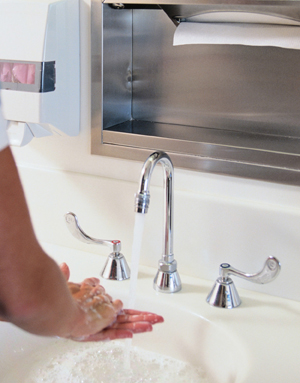Preventing Infection During Your Hospital Stay
Essentia Health makes every effort to provide safe care for you or your family member. Please help us reduce the risk of infection during your hospital stay or visit.
Infection is caused by germs. An infected person carries germs that he or she can give to others. Even a person who doesn't feel sick can still carry and spread germs. Germs can cause infection by traveling through the air or through direct contact.
Wash your hands
The most common way to spread germs is on your hands. The best way to reduce the risk of spreading germs is to clean your hands.
-
Always clean your hands after using the bathroom, blowing your nose, coughing, sneezing, and before eating.
-
Always clean your hands before entering and leaving the hospital room.
-
Clean your hands with the hand sanitizer located by the room entrance.
-
Wash your hands with soap and water if you see that they are dirty.
-
You can also use the hand wipes that are at the bedside.
|

|
To wash your hands with soap and water:
-
Turn on the water faucet.
-
Wet your hands with warm running water.
-
Put soap on your hands.
-
Rub your hands together for at least 15 seconds.
-
Cover your whole hands.
-
Be sure to wash between your fingers and under fingernails.
-
Rinse your hands with running water.
-
Dry your hands with a paper towel.
-
Use a paper towel to turn off the faucet.
To use wash your hands with a waterless hand sanitizer:
Ask your health care team and your visitors if they have washed their hands before they touch you or your family member.
Coughs and sneezes
You can reduce the risk of spreading germs when you cough or sneeze.
Special precautions (isolation)
If you or your family member has an illness that needs special precautions, an isolation sign will be posted outside your door. Your nurse will explain what you must do and what this means for staff and visitors who enter your room.
You may be asked to wear a mask, gloves, or gown when you visit. Follow instructions carefully.
A “central line” or “central catheter” is a tube that is put into a large vein to give medicines, blood, or fluids you may need. The line may need to stay in place for days or weeks.
It is important to prevent infection when you have a central line. Everyone should clean their hands before and after touching the line or the skin around the line.
Your healthcare team will check your skin around the line every day for signs of infection. The signs are redness, warmth, an increase in drainage, or pain. They will also check every day to see if you still need the line.
Preventing surgery site infections
-
Follow the instructions your doctor gave you about showering and cleaning your skin before surgery.
-
If hair must be removed for your surgery, your healthcare team will remove it with a clipper. Do not shave the area, as nicks in your skin can lead to infection.
-
For some surgeries, you will receive an antibiotic before surgery.
-
Generally, there is no need for antibiotics for more than 24 - 48 hours after surgery.
-
Everyone (you and your healthcare team) should clean their hands before and after touching your incision.
-
Tell your nurse if your incision is warm, painful, red, or has more drainage.
Preventing infections of your urinary catheter
A urinary catheter is a thin tube that drains urine from your bladder. Urine drains through the tube and collects in a bag. You may need a urinary catheter:
-
If you are not able to pass urine on your own
-
During and after some types of surgery or tests
-
To measure how much urine you make
People with urinary catheters have a higher chance of getting a urinary tract infection than people who don’t have a catheter. The chance of infection increases the longer a catheter stays in place. For this reason, your healthcare team will check every day to see if you still need the catheter.
Everyone should clean their hands before and after touching the catheter.
Be sure to tell your nurse if the catheter comes out or if you have pain, pressure, or the sudden urge to pass urine.
Preventing ventilator-associated pneumonia
A ventilator is a machine that helps you breathe. It supplies extra oxygen to your lungs. Ventilator-associated pneumonia (VAP) is a lung infection you can get while you use the ventilator. To reduce the risk for a lung infection:
-
The head of your bed will be kept at 30 degrees, except when someone is giving you care or if your health doesn’t allow it.
-
You may receive medicines to prevent ulcers and blood clots.
-
Your healthcare team will check each day to see if you can try breathing on your own.
-
Your teeth will be brushed and your mouth rinsed with an antiseptic solution on a regular basis. This helps prevent the build-up of germs.
-
Everyone should clean their hands before and after touching the ventilator or ventilator tubes.
Here are other ways to prevent the spread of infection:
-
Keep your hands away from your face.
-
Visitors should not use the patient's bathroom.
-
Stay up to date on immunizations. Ask your nurse or doctor if you need influenza or pneumonia vaccines (shots).
If you have concerns about your safety, talk to your nurse or to the Essentia Health Patient Relations Office.
Thanks for your partnership.
You are an important member of the health care team!